Ustad Taufiq Qureshi and Gino Banks inherited more than a passion for rhythm from their illustrious fathers. Over an Pan-Asian meal, the two master percussionists share stories of their sonic and culinary discoveries, and the quest for creating unique music
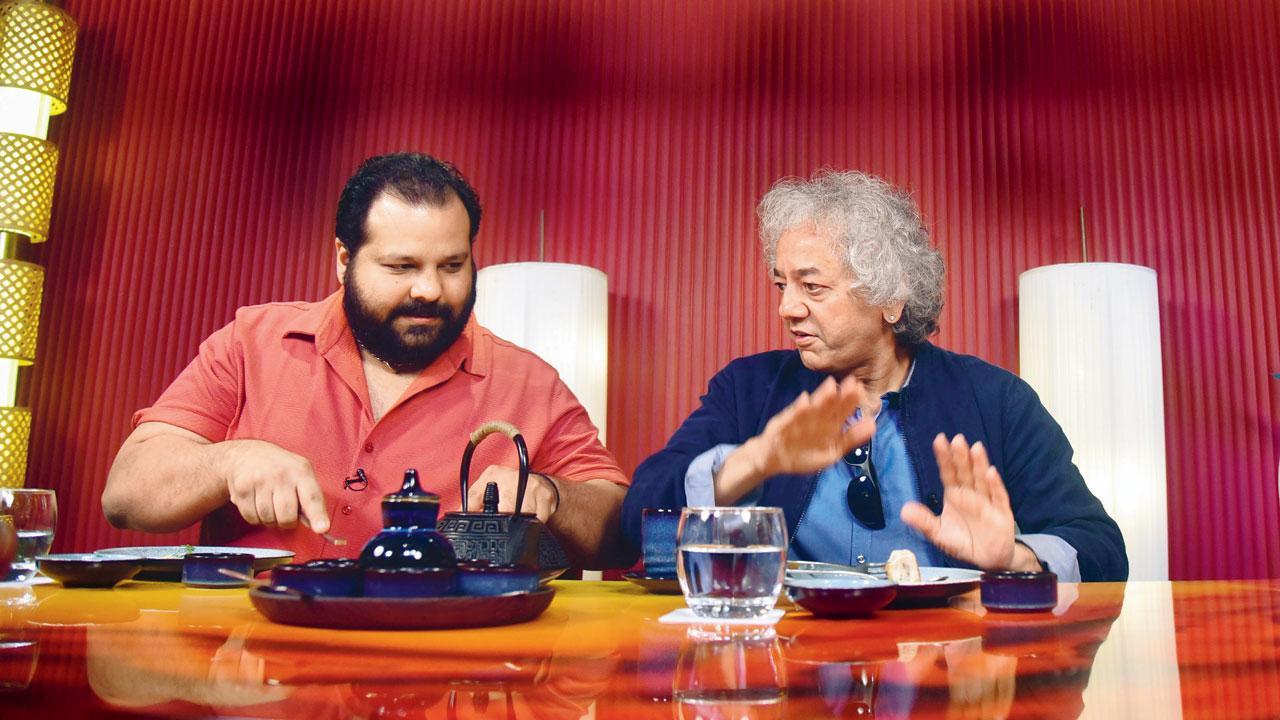
Gino Banks and Taufiq Qureshi jam at the table. Pics/Shadab Khan
It is apt that the thrums of a cool January morning at Lower Parel’s Kamala Mills are slowly setting the pace as we wait for two musicians at Koko. Gino Banks and Ustad Taufiq Qureshi might have a few decades separating them, but they share a natural chemistry that is inherent to those attuned to rhythms.
Their bonding is also one of comradeship. Both percussionists share a legacy of being born into musical royalty. “I grew up in a family of live musicians and performers,” Banks shares. For Qureshi, the journey began under the tutelage of his father, the legendary Ustad Allah Rakha Khan, but different rhythms caught his ear. “I would go crazy when I would hear Pancham Da [RD Burman] as a kid,” he shares with delight. It does not take us much to get the two jamming over food, fusion and fascinating stories as we dig into the opening course of karafuru salad and some dim sum.
Here are some edited excerpts from the interview:
ADVERTISEMENT
Taufiqji, your musical legacy stems from your father, Ustad Allah Rakha Khan sahib. What led to your search for a different sound?
Taufiq Qureshi (TQ): The first time I heard an album was one of my father and Buddy Rich, the great drummer on Rich à la Rakha. I would hear that LP four or five times a day just for its drums. I was always drawn to the other rhythm from an early age.
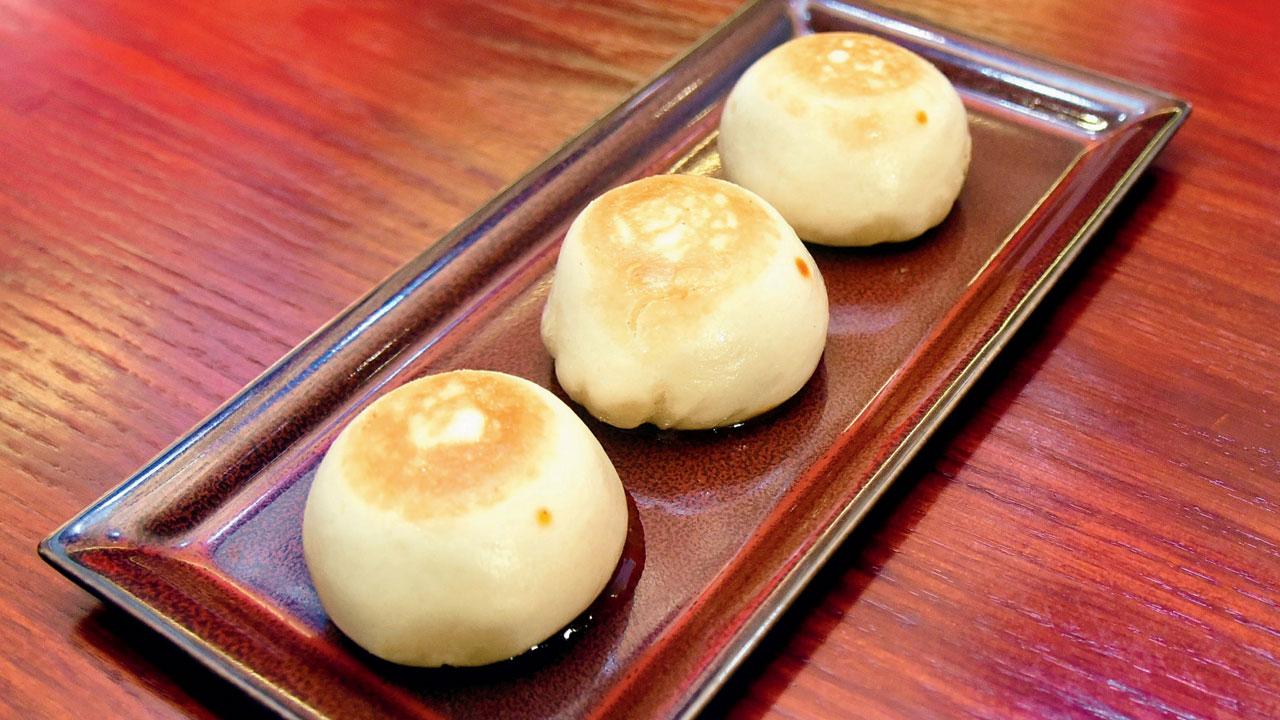
Spicy chicken bao
Is this similar to your own beginnings, Gino?
Gino Banks: Even though I was learning the piano, my father never forced it on me. I just took to the drums naturally. Maybe because I saw people around me play at such a high level, I loved it.
But when did you feel the need to branch out in search of a new sound?
TQ: As a kid, I would pretend to play drums on those dalda dabbas. But it was only in college that I realised the need for another language to express the knowledge that my father had given me. That search ended with the djembe.
GB: Did you ever try your hand at drums?
TQ: Yeah, I would sit by Ranjit bhai [Barot] and he would sometimes let me try out on his drum set.
GB: But were you comfortable with the sticks? Because you learned the hand technique.
TQ: That knowledge came in from school. On Republic Day and Independence Day, I would watch the drummers play in the shade, while we were marching in the August heat. When one of the drummers was transferred to another school, I volunteered. It’s where I learned to use the drum sticks.
GB: It was the same with me. I was in my school band too. By then, I had also started to learn from Cawas Lord about the right way to use sticks and other rudimentary lessons.
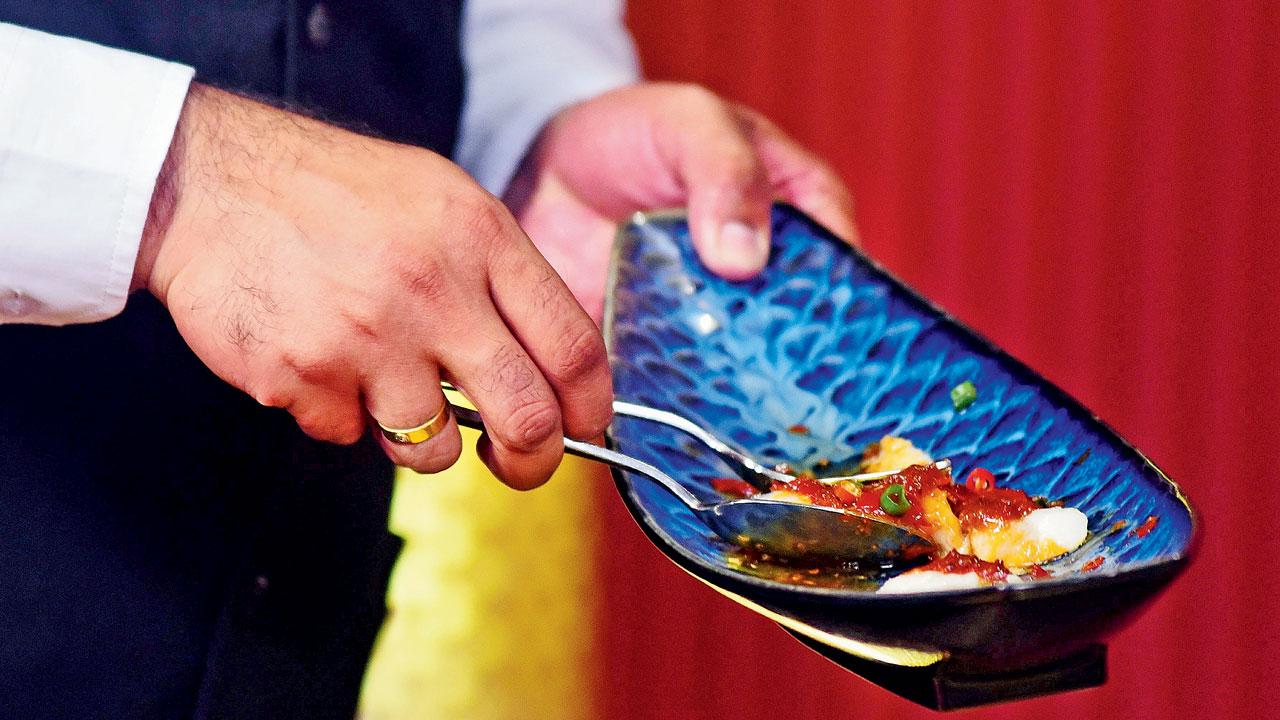
Steamed snapper with spicy chopped chilli sauce
One of my favourite memories of school is playing on the desks when classes were done. Did you guys ever do that?
TQ: I was playing even when classes were on [laughs]. I was always a backbencher. We had those opening desks that had a nice bass sound. We would be grooving in class with friends singing. Every teacher knew that if there was a rhythm going, it had to be Qureshi. I would be sent out of class more often than not.
GB: I would play on the desk a lot as well. It was natural to look for the low and the high sound on those desks. The only trouble was we would be rotated between last bench and front benches. So, I had to stay quiet when at the front.
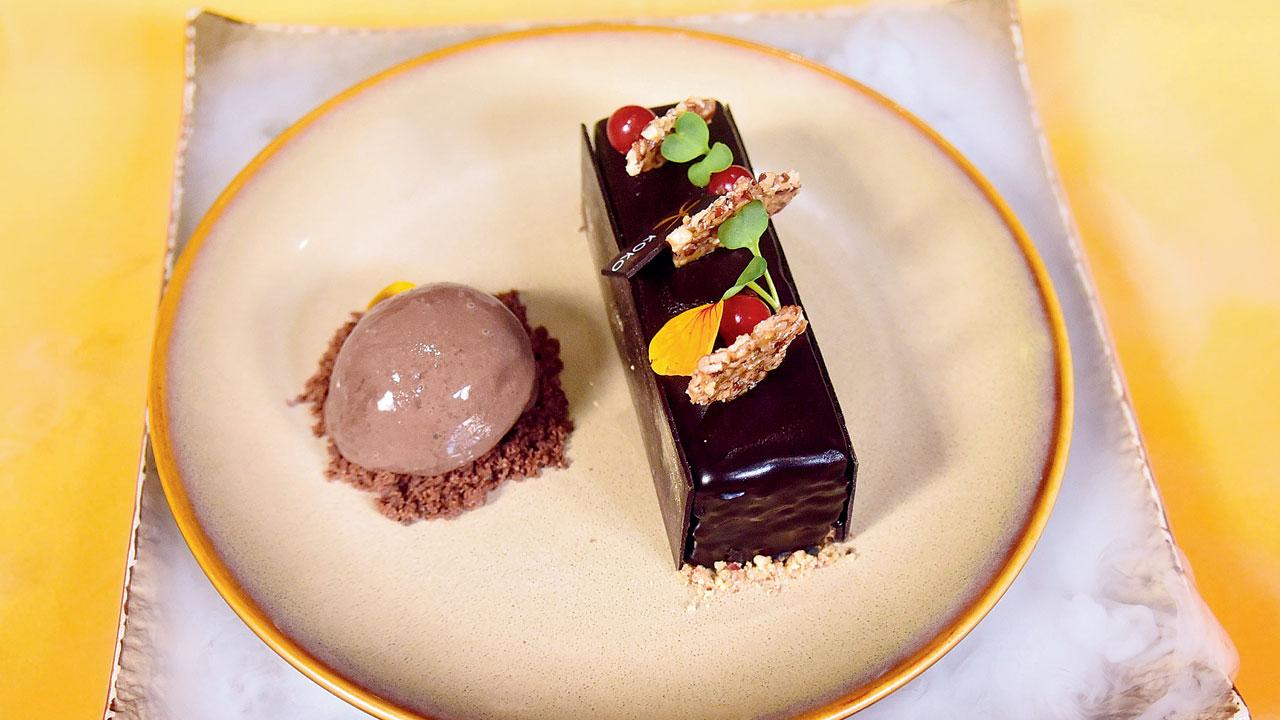
Coffee pecan nut mousse
Being Mumbai boys, what are the sounds that you associate the most with this city?
GB: I feel that the drum set is a very city instrument. It is not a folk instrument. Mumbai is an apt place to be a drummer.
TQ: I grew up in Mahim, next to Maqdoom Shah Baba’s Dargah till the age of 11. Every Friday, there would be a call for prayers, preceded by the nagada. If I was home, I would run to the masjid on hearing the sound. At their Urs procession, there would be different forms of drums, totas, shehnais. I remember the descendants of the East African community from Gujarat [Siddis] would bring those African drums to play. I was fascinated by these diverse sounds.
What does the term fusion mean, to both of you?
GB: Fusion is important to me, even though I play a lot of stylised music in their pure form. To do fusion very well, the musicians have to come from a very pure form of music and an open mind. The best kind of fusion is where you can’t see the difference between East and West.
TQ: For fusion, we need to be well versed in one form and understand the other form in the proper way. The main course of spicy chicken bao, crispy prawn cheung fun, delicious steamed snapper and an egg fried rice arrives on the table.
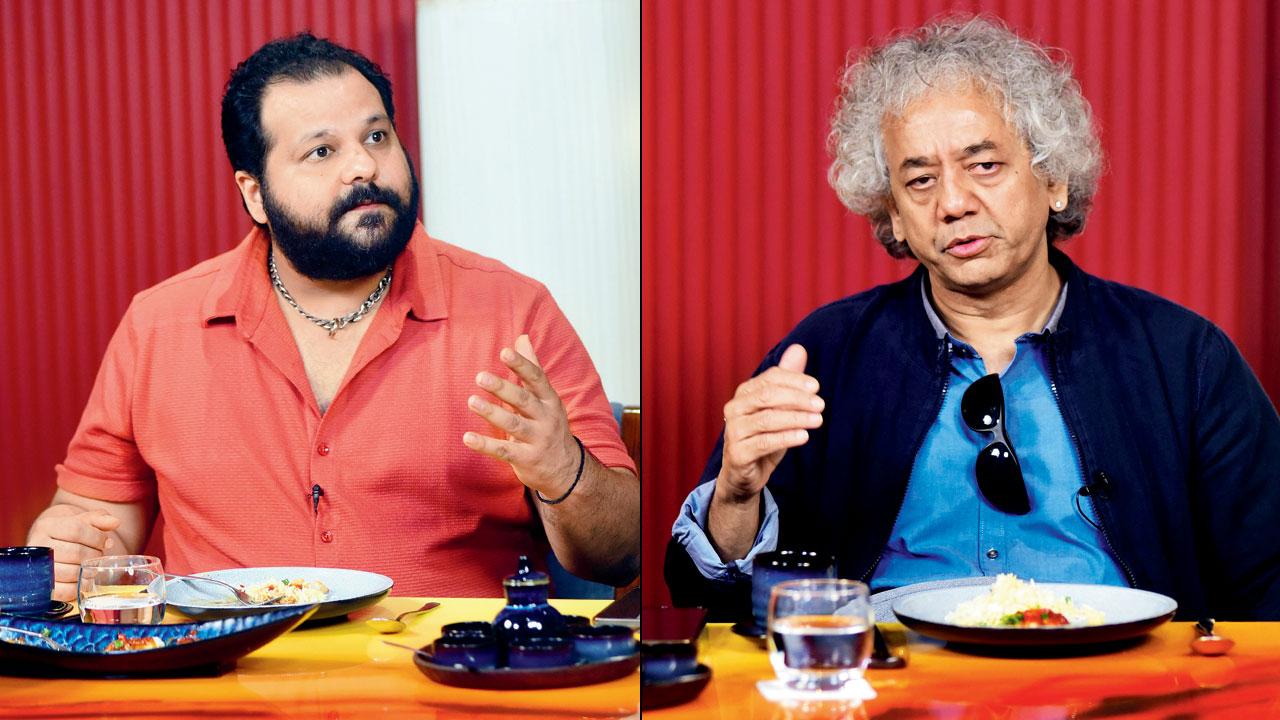
Gino Banks (right) Ustad Taufiq Qureshi share thoughts over lunch
Both of you are foodies. What was your comfort food growing up at home?
GB: At home, it was dal-chawal staple. There was always fish or chicken. But my go-to cuisine is Chinese or Pan-Asian food. My wife Eden and I, no matter where we are in the world, always look for a Chinese restaurant first.
TQ: My mother and sisters would cook. Mutton kheema was my favourite. My mother was very strict about vegetables in the meat as well. Her karela gosht was the best. Now, karela (bitter gourd) is a very bitter vegetable. But her recipe never had any bitterness. I remember Ustad Ali Akbar Khan and Ustad Amjad Ali Khan coming over just to eat her karela gosht. Some days when my father was home, he would take over the kitchen. Wearing just a lungi and ganji, he would cook sitting down on the floor over a stove pot. That mutton was the best I have tasted. Even my mother would agree to that.
How would you describe rhythm?
GB: Rhythm is life.
TQ: I agree. Your heartbeat is in rhythm. Your pulse is in rhythm. Your breath is in rhythm. It is all around us.
>>Mid-Day at YouTube
Quick takes
>> Top album
Gino Banks: The Heart of Things with Dennis Chambers on the drums and John McLaughlin always ignites a fire in me.
Ustad Taufiq Qureshi: Shakti’s first album, Natural Elements. It triggered things in my head.
>> Favourite vocalist
GB: Steve Hogarth from Marillion for his phrasing and tone.
TQ: Lata Mangeshkar, always.
>> Unforgettable movie
GB: Jaws. The theme song had a lot to do with it.
TQ: Ben Hur. I still remember seeing it at Minerva theatre in Cinemascope.
 Subscribe today by clicking the link and stay updated with the latest news!" Click here!
Subscribe today by clicking the link and stay updated with the latest news!" Click here!








